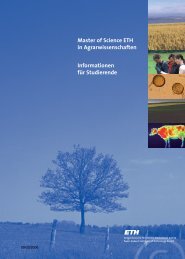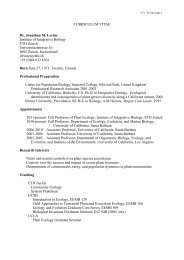Environmental Sciences education under the ... - ETH - ETH Zürich
Environmental Sciences education under the ... - ETH - ETH Zürich
Environmental Sciences education under the ... - ETH - ETH Zürich
- No tags were found...
You also want an ePaper? Increase the reach of your titles
YUMPU automatically turns print PDFs into web optimized ePapers that Google loves.
<strong>Environmental</strong> <strong>Sciences</strong> <strong>education</strong><strong>under</strong> <strong>the</strong> microscopeDo graduates promote a societal changetowards sustainability?Departement UmweltwissenschaftenDepartment of <strong>Environmental</strong> <strong>Sciences</strong>
CONTENTS1 Introduction...............................................................................................................................................21.1 Historical background........................................................................................................................................ 21.2 Formative evaluation system.......................................................................................................................... 31.3 Specific evaluation study.................................................................................................................................. 52 The success of graduates on <strong>the</strong> job market and in promoting sustainable development........ 82.1 Performance on <strong>the</strong> labour market..............................................................................................................82.2 Perceived contributions to sustainable development........................................................................ 103 The impact of <strong>Environmental</strong> <strong>Sciences</strong> graduates on Swiss economy, public administrationand society............................................................................................................................................... 153.1 Four statements on <strong>the</strong> impact of <strong>Environmental</strong> <strong>Sciences</strong> graduates on Swiss economy,public administration and society...............................................................................................................153.2 General impact on integrative sustainability.........................................................................................17.4 <strong>Environmental</strong> <strong>Sciences</strong> <strong>education</strong> and career..................................................................................194.1 General assessment of <strong>the</strong> <strong>Environmental</strong> <strong>Sciences</strong> <strong>education</strong>.................................................... 194.2 <strong>Environmental</strong> <strong>Sciences</strong> <strong>education</strong> and professionalization............................................................214.3 Fur<strong>the</strong>r academic <strong>education</strong> and academic careers........................................................................... 23.4.4 Survey amongst high school students......................................................................................................245 Research in <strong>the</strong> context of <strong>the</strong> formative evaluation system..........................................................256 Concluding remarks...............................................................................................................................27.7 Bibliography........................................................................................................................................... 287.1 Quality management.......................................................................................................................................287.2 Research................................................................................................................................................................ 30ImpressumEditorDepartment of <strong>Environmental</strong> <strong>Sciences</strong> <strong>ETH</strong> Zurich (D-UWIS)Authors Sibyl H. Brunner, graduate D-UWISDr. Peter Frischknecht, study coordinator D-UWISDr. Ralph Hansmann, senior scientist D-UWISProf. Dr. Harald A. Mieg, Professor for Metropolitan Studies and Innovation, HumboldtUniversity Berlin, Germany, project leader of <strong>the</strong> impact assessment studyLayout Sibyl H. BrunnerCover Picture Simón SchwarzEdition May 2010www.env.ethz.ch1
1 INTRODUCTIONThis report summarises <strong>the</strong> major findings of regular evaluations and special studies on graduatesof <strong>the</strong> <strong>Environmental</strong> <strong>Sciences</strong> Department of <strong>the</strong> <strong>ETH</strong>. The historical background of <strong>the</strong>study programme and <strong>the</strong> evaluation instruments are described in <strong>the</strong> introductory section.The graduates’ careers, <strong>the</strong>ir positions and occupational areas, including <strong>the</strong>ir perceived contributionsto sustainable development, are subsequently presented. The third section offers <strong>the</strong>perspective of external experts on <strong>the</strong> impact of <strong>the</strong> graduates on Swiss economy and society.Finally, <strong>the</strong> performance of <strong>the</strong> study programme is discussed on <strong>the</strong> basis of <strong>the</strong> outcomeindicators of <strong>the</strong> Swiss Federal Statistical Office and of <strong>the</strong> perceived qualifications of <strong>the</strong> graduates.1.1 Historical backgroundIn <strong>the</strong> late eighties, accidents like Chernobyl and Schweizerhalle demonstrated that intensive economicand technological anthropogenic activities create environmental problems of increasingcomplexity and that society fails in adequately dealing with <strong>the</strong>m. The lack of and need for expertsin analysing, <strong>under</strong>standing and handling <strong>the</strong>se problems motivated <strong>the</strong> introduction of <strong>the</strong> <strong>Environmental</strong><strong>Sciences</strong> curriculum at <strong>ETH</strong> Zurich in 1987. In contrast to traditional natural scienceswhich aim at <strong>the</strong>ory development in single disciplines, <strong>the</strong> new programme was intended to bepractice-oriented and to follow a holistic approach with a focus on <strong>the</strong> environment as a system.Students were meant to acquire skills to <strong>under</strong>stand, handle and solve real-world problems andhence promote sustainable development 1,2 .However, at <strong>the</strong> time when <strong>the</strong> programme started, <strong>the</strong> concept of environmental problem solvingcompetence was not well-established, and <strong>the</strong> new format of university <strong>education</strong> initiallylacked an elaborate and clear profile. Lecturers with traditional natural sciences backgrounds hadto reform science teaching and develop an integrative curriculum that imparted <strong>the</strong> aspired skillsto <strong>the</strong> students:• A basic training in ma<strong>the</strong>matics and all major natural sciences was followed by an interdisciplinary<strong>education</strong> with a focus on a specific natural system and its complex processes.• Classes in social sciences, humanities and environmental technology addressed <strong>the</strong> interactionsbetween nature and civilisation.• A new didactic approach - namely, <strong>the</strong> transdisciplinary case study – was introduced to evolvefrom <strong>under</strong>standing and applying scientific methods to tackling and solving real world problemsand to train communication skills.• Finally, a compulsory practical work experience at <strong>the</strong> end of <strong>the</strong> programme aimed to fur<strong>the</strong>r1 Müller-Herold U. (1990). Umweltnaturwissenschaften: Erfahrungen mit einem neuen multidisziplinären Studiengang an der<strong>ETH</strong> Zürich. In Mainzer K (ed.): Natur und Geisteswissenschaften. Perspektiven und Erfahrungen mit fachübergreifenden Ausbildungsinhalten.Berlin, Springer Verlag.2 Gigon A, Frischknecht PM, Scherz B. (1993). Umweltnaturwissenschaften – der neue Studiengang an der Eidgenössischen TechnischenHochschule Zürich. In Pfadenhauer J (ed.): Verhandlungen der Gesellschaft für Ökologie 22:365-370.enhance <strong>the</strong> students’ cooperation skills and <strong>the</strong>ir <strong>under</strong>standing of how environmentally compatiblesolutions are developed and implemented in practice.The new <strong>education</strong>al unit was faced with considerable scepticism from within and outside of <strong>the</strong><strong>ETH</strong>. Since a distinguished professional field was not yet established, it was unclear whe<strong>the</strong>r <strong>the</strong><strong>education</strong>al programme would open up sufficient occupational options for <strong>the</strong> graduates. Eventhough environmental problems such as deforestation of <strong>the</strong> rainforest or water and air pollutionwere evident, <strong>the</strong> prospective demand for environmental scientists on <strong>the</strong> labor market was putin doubt. In addition, critics questioned <strong>the</strong> probability of a successful generalist <strong>education</strong> anddismissed <strong>the</strong> design of <strong>the</strong> curriculum as inadequate for a sound natural science <strong>education</strong>. Criticsfur<strong>the</strong>r suggested that an <strong>education</strong>al programme in a traditional discipline complementedwith a post graduate environmental curriculum would be a more appropriate approach to achieve<strong>the</strong> <strong>education</strong>al goals. The <strong>ETH</strong> <strong>Environmental</strong> <strong>Sciences</strong> fo<strong>under</strong>s were confronted with commentsthat <strong>the</strong>ir programme would cover “psycho-socio-ethno-chemistry” and train environmental activists“who talk about everything and know nothing” and are thus unable to contribute to solvingexisting problems.Against this background, a comprehensive quality control and evaluation of <strong>the</strong> success of <strong>the</strong>curriculum was considered essential from <strong>the</strong> very beginning. A continual evaluation system wasimplemented and fur<strong>the</strong>r supplemented through various specific evaluation projects running inparallel.1.2 Formative evaluation systemDuring <strong>the</strong> last 23 years, <strong>the</strong> evaluation activities of <strong>the</strong> department have focused on two key aspects:• Assessment of <strong>the</strong> skills imparted to students and <strong>the</strong> resulting qualification profile of <strong>the</strong> graduates,in order to develop and adapt didactical methods and to continuously improve <strong>the</strong> structureand content of <strong>the</strong> curriculum.• Analysis of <strong>the</strong> professional situation of graduates (e.g. percentage of employed people, income,personal satisfaction with professional activity) and <strong>the</strong> qualifications required on <strong>the</strong> job market,to enable fur<strong>the</strong>r refinement of <strong>the</strong> profile of an environmental scientist.These activities are embedded in a continuous process of assessment, reflection and improvementof <strong>the</strong> quality of <strong>the</strong> programme (Figure 1). The management system takes into account variousinstruments for evaluating different curriculum aspects and allows discussion and interpretationof results in diverse reflective boards.The establishment of this system led to in-depth investigations of several research questionswhich produced results that have been integrated in <strong>the</strong> evaluation process.Reflective boardsThe evaluation system of <strong>the</strong> department involves students, graduates, assistants, professors, didacticalexperts and external stakeholders such as employers and professional organisations as2 Department of <strong>Environmental</strong> <strong>Sciences</strong> 3www.env.ethz.ch
Figure 1. Management system for assessing, reflecting and improving <strong>the</strong> quality of <strong>the</strong>curriculum.ImprovementSteering Board of <strong>the</strong>DepartmentThe Advisory Committee was founded in 1995 to institutionalise <strong>the</strong> perspective of leaders of <strong>the</strong>Swiss economy and public administration.Suggestions resulting from discussions in <strong>the</strong>se groups allow <strong>the</strong> Steering Board of <strong>the</strong> departmentto integrate a broad range of perspectives before decisions are taken and changes to <strong>the</strong>curriculum are implemented.QualityCoursesCurriculumSubject-specific SkillsTeaching StaffStudentsReflectionTeaching CommitteeEvaluation ColloquiumContinuous evaluation instrumentsAs in all o<strong>the</strong>r departments at <strong>ETH</strong> Zurich and in many o<strong>the</strong>r universities, <strong>Environmental</strong> <strong>Sciences</strong>students provide bi- or triennial single course evaluations to give feedbacks to <strong>the</strong> lecturers on<strong>the</strong> strengths and weaknesses of <strong>the</strong>ir classes. The quantitative ratings and individual qualitativecomments of <strong>the</strong> standardised questionnaire are compulsorily discussed by <strong>the</strong> lecturers and students.This evaluation tool provides feedback on <strong>the</strong> relative performance of different curricula at<strong>the</strong> <strong>ETH</strong> level as well as on <strong>the</strong> relative performance of single courses within a programme.General SkillsInnovationAssessmentCourse EvaluationEvaluation of WorkExperienceAdvisory CommitteeSince 1994, <strong>the</strong> department has also conducted evaluations of <strong>the</strong> work experience that is compulsoryfor all <strong>Environmental</strong> <strong>Sciences</strong> students. The qualification-oriented questionnaires are answeredby <strong>the</strong> students as well as by <strong>the</strong>ir supervisor in <strong>the</strong> host organisation and <strong>the</strong>refore allow ananalysis of <strong>the</strong> curriculum component from different perspectives. Results of <strong>the</strong> surveys are usedto evaluate <strong>the</strong> extent to which <strong>the</strong> work experience contributes to <strong>the</strong> students’ problem solvingcompetence.Educational ResearchGraduate SurveysPeer-Review of <strong>the</strong>DepartmentResearchResearch into Professionsactive participants in surveys and as members in specific discussion boards.An Evaluation Colloquium that includes professors and staff members of <strong>the</strong> department as wellas external experts and representatives of <strong>the</strong> department’s graduates organisation generallyplans evaluation activities and interprets <strong>the</strong>ir findings.The Teaching Committee discusses <strong>the</strong>se findings with respect to curricular and didactical implicationsand conclusions. It is chaired by <strong>the</strong> department‘s Study Director and composed of <strong>the</strong>representatives of professors, assistants and students in equal parts. There is a partial overlap between<strong>the</strong> members of <strong>the</strong> Teaching Committee and <strong>the</strong> Evaluation Colloquium to ensure mutualflow of information.The major continual evaluation instruments are surveys of <strong>the</strong> graduates on <strong>the</strong>ir first professionalexperience (conducted two years after graduation) and on subsequent career stages (conductedbiennially six or seven years after graduation). As <strong>the</strong>se surveys began with <strong>the</strong> first graduatingclass in 1992, by 2009 <strong>the</strong> dataset encompassed <strong>the</strong> first career steps of more than 1200 graduates(16 graduating classes from 1992 to 2007) and <strong>the</strong> fur<strong>the</strong>r professional activities six to sevenyears after graduation of 12 graduating classes (graduates from 1992-2003). The first survey is anespecially powerful instrument not only in evaluating <strong>the</strong> graduates’ success on <strong>the</strong> job marketbut also in investigating <strong>the</strong> links between professional activities and <strong>the</strong> curriculum: The questionnaireaddresses <strong>the</strong> qualification profile that graduates require in <strong>the</strong>ir current position as wellas <strong>the</strong> skills <strong>the</strong>y acquired during <strong>the</strong>ir studies. Thus, <strong>the</strong> graduates inform on crucial aspects ofenvironmental problem solving competence and whe<strong>the</strong>r <strong>the</strong>se have been imparted through <strong>the</strong>programme.1.3 Specific evaluation studyThe departments of <strong>the</strong> <strong>ETH</strong> are evaluated on a regular basis by applying international standardsfor scientific and teaching excellence. In view of <strong>the</strong> upcoming evaluation of <strong>the</strong> <strong>Environmental</strong><strong>Sciences</strong> Department in 2010, a particular interest was to find out whe<strong>the</strong>r <strong>the</strong> establishment of<strong>the</strong> initially controversial teaching programme had met <strong>the</strong> aspirations of its fo<strong>under</strong>s. Therefore,a comprehensive study has been carried out on <strong>the</strong> pivotal question of whe<strong>the</strong>r graduates of <strong>Environmental</strong><strong>Sciences</strong> are able to handle complex environmental problems in a way that supports4 Department of <strong>Environmental</strong> <strong>Sciences</strong> 5www.env.ethz.ch
societal change towards sustainability. The general concept of <strong>the</strong> study is shown in Figure 2.The first step was an expert workshop where a dual approach to <strong>the</strong> study was designed:(1) An input-output analysis on <strong>the</strong> success of <strong>Environmental</strong> <strong>Sciences</strong> as a teaching programme.This study aimed to cover <strong>the</strong> full <strong>education</strong>al cycle: Maturanden (Swiss high school graduates)- graduates - doctoral students - post docs. The focus was meant to lie on a quantitative careeranalysis.Figure 2. Concept of <strong>the</strong> specific evaluation study on <strong>the</strong> impact of <strong>Environmental</strong> <strong>Sciences</strong>graduates on Swiss economy and society.Input-Output Analysis:From High-school Studentsto GraduatesHypo<strong>the</strong>sesCareer Studies• Graduates• Former Doctoral Students• Former Postdocs + AssistantsImage StudyMaturanden(High SchoolGraduates)Study-Design Workshop with Expertsin Research on Vocational Trainingand EvaluationDiscussion by <strong>the</strong>Advisory CommitteeReportsImpact Analysis:Swiss Societyand EconomySocial System Interviews• Economy• Public Administration• Civil SocietyStatements, Impact TableExpert Workshop for ImpactAssessment(2) An impact analysis with key companies and public institutions in Switzerland. The main instrumentwas to be an expert workshop with representatives of Swiss society and its economy.The analysis as well as <strong>the</strong> group of experts intended to cover <strong>the</strong> core Swiss social system:Economy – Politics/Public administration - Civil Society - Science.The second step comprised <strong>the</strong> analyses of career development 3 . 808 graduates from 1992 to 2005were invited via email to complete an extensive web-based questionnaire. 70% responded at leastto <strong>the</strong> first question, and 55% completed <strong>the</strong> entire questionnaire. Information was elicited on <strong>the</strong>following:• professional activities since graduation (e.g. income, position, size of company/organisation,field of activities) and advantages of <strong>the</strong>ir <strong>Environmental</strong> <strong>Sciences</strong> <strong>education</strong> for <strong>the</strong>se activities;• engagement in sustainable development through <strong>the</strong>se professional activities in general and bymeans of two examples of best practice;• <strong>the</strong> assessment of <strong>the</strong> best practice example with regard to (1) <strong>the</strong> integration of <strong>the</strong> ecological,economic and social dimensions of sustainability; (2) conflicts between <strong>the</strong>se three dimensions;and (3) evaluation or monitoring of <strong>the</strong> achieved effects. The concept of sustainable developmentwas not introduced by definition, but ra<strong>the</strong>r was investigated on <strong>the</strong> basis of <strong>the</strong> 15 goalsstated in <strong>the</strong> Swiss Strategy for Sustainable Development as defined by <strong>the</strong> Schweizerischer Bundesrat4 ;In an additional image study, <strong>the</strong> expectations, interests and professional objectives of high schoolstudents that intended to enrol in <strong>the</strong> curriculum were elicited 5 . Moreover, a survey amongst formerdoctoral students, postdocs and senior researchers was carried out to record <strong>the</strong>ir academiccareers 6 .The third step was <strong>the</strong> impact analysis 7 . To prepare <strong>the</strong> expert workshop, interviews with expertsand representatives of three Swiss social systems were conducted: Economy - Politics / Public Administration- Civil Society. Science as a social system was not included, since in 2010 internationalresearch experts intensively evaluated <strong>the</strong> scientific impact.The main input for <strong>the</strong> expert workshop consisted of four statements about <strong>the</strong> impact of <strong>ETH</strong><strong>Environmental</strong> <strong>Sciences</strong> on Swiss economy and society. The invited experts and decision makershad to reflect on and supplement <strong>the</strong> statements. In addition, <strong>the</strong>y had to quantitatively assess<strong>the</strong> impacts.The fourth and final step was <strong>the</strong> discussion and approval of <strong>the</strong> study results by <strong>the</strong> AdvisoryCommittee of <strong>ETH</strong> <strong>Environmental</strong> <strong>Sciences</strong>.3 Hansmann R, Mieg HA, Frischknecht P. (2010). Survey of Graduates of <strong>Environmental</strong> <strong>Sciences</strong> from 1992 to 2005: Analysis of <strong>the</strong>irCareers and <strong>the</strong>ir Contributions to Sustainable Development. Zürich: <strong>ETH</strong> Zürich D-UWIS.4 Schweizerischer Bundesrat. (2002). Strategie Nachhaltige Entwicklung. Bern.5 Hansmann R, Mieg HA, Frischknecht P. (2009). Ergebnisse einer Internet-Befragung von Maturandinnen und Maturanden zurAnalyse des Images von Umweltnaturwissenschaften sowie des Zusammenhangs zwischen persönlichen Interessen und Überlegungenhinsichtlich eines Studiums. Zürich: <strong>ETH</strong> Zürich D-UWIS.6 Unpublished result7 Mieg HA. 2010. The Impact of <strong>the</strong> Establishment of <strong>Environmental</strong> <strong>Sciences</strong> at <strong>ETH</strong> on Swiss Economy and Society: An EvaluationStudy. Berlin, Zürich: Humboldt-Universität zu Berlin, Geographisches Institut, <strong>ETH</strong> Zürich D-UWIS.6 Department of <strong>Environmental</strong> <strong>Sciences</strong> 7www.env.ethz.ch
2 THE SUCCESS OF GRADUATES ON THEJOB MARKET AND IN PROMOTINGSUSTAINABLE DEVELOPMENTResults from graduate surveys demonstrated that <strong>Environmental</strong> <strong>Sciences</strong> graduates have anexcellent acceptance on <strong>the</strong> job market. They succeeded in accessing a broad variety of professionalfields, especially in <strong>the</strong> private sector, and in reaching income levels comparable toor higher than people in <strong>the</strong> same position with o<strong>the</strong>r <strong>education</strong>al backgrounds, even thoughsalary was not mentioned as <strong>the</strong> main criterion for career decisions. In addition, <strong>the</strong> graduatessignificantly contributed to sustainable development in all four societal sectors. Their perceivedinfluence on sustainable development increased with career advancement, and some individualssuccessfully integrated sustainability in professional fields weakly related to <strong>the</strong> issue.2.1 Performance on <strong>the</strong> labour marketIn 2009, on average six years after graduation, 96% of <strong>the</strong> survey participants were professionallyactive. This employment rate 8 is considerably higher than in comparable age groups of <strong>the</strong> Swissgeneral population (87%) 9 and similar to <strong>the</strong> rate of o<strong>the</strong>r Swiss university students five years aftergraduation (95%) 10 . The regular graduate surveys from <strong>the</strong> past 11 years showed that <strong>the</strong> rate isslightly lower two years after graduation (on average 92%, Table 1). However, this is in line with surveysamongst graduates of all Swiss universities which generally show an increase in <strong>the</strong> numberof employed persons in <strong>the</strong> course of <strong>the</strong> first five years after graduation 10 . Overall, our findingsshowed satisfying employment rates suggesting that <strong>the</strong> professional market for environmentalscientists is not particularly or strongly influenced by fluctuations in <strong>the</strong> economy.Table 1. Employment situation of graduates 1997-2007.Year of interviewYear of graduationEmployedSeeking employmentNumber of job-seeking peopleNumber of interviewed people1997 1998 1999 2000 2001 2002 2003 2004 2005 2006 20071995 1996 1997 1998 1999 2000 2001 2002 2003 2004 200697% 83% 94% 94% 96% 95% 100% 87% 91% 87% 87%1%17413%8634%4943%2722%1512%1400%0269%4457%34411%6558%786The graduates work in all four societal sectors: <strong>the</strong> private sector (~50%), public administrationand <strong>education</strong> (~25%), <strong>the</strong> scientific sector (~20%) and civil society (NGOs, ~5%). Table 2 shows that<strong>the</strong> most prominent fields of professional activity are environmental planning and consulting, publicadministration and universities. A high percentage of graduates also work in banks and insurances,in positions with attractive income prospects and special possibilities for contributing tosustainable development. Fur<strong>the</strong>r activities are dispersed over a broad range of professional fieldsand reveal a variety of career opportunities for environmental scientists that exceeds <strong>the</strong> expectationsof <strong>the</strong> fo<strong>under</strong>s at <strong>the</strong> inception of <strong>the</strong> programme 11 .Table 2. Fields of professional activity with median incomes and <strong>the</strong>ir relation to sustainability(N = 520, on average approximately 6 years after graduation).Fields of professional activity<strong>Environmental</strong> planning & consultingPublic administrationUniversitiesBanks & insurancesEducationResearch outside universities<strong>Environmental</strong> NGOsFinancial & management consultingHealth sectorEnergy & water supplyO<strong>the</strong>r industryTransportMediaChemical industryCommerceFarming/forest/gardenConstruction industryO<strong>the</strong>r public servicesO<strong>the</strong>rFraction ofgraduatesemployed [%]15151310875433222211142Medianannual income[CHF]94‘000116‘00095‘000 b)130‘000110‘000100‘000 b)100‘000150‘000110‘000130‘000125‘000119‘00096‘000150‘00090‘00088‘00091‘000116‘000100‘000Relation offield tosustainability a)a) Scale: 1 = no relation, 2 = ra<strong>the</strong>r no, 3 = ra<strong>the</strong>r yes, 4 = yes, 5 = yes, very strong relation of professional activity to sustainability;values < 2.5 denote no or very little relation to sustainability.b) When excluding graduates currently working on <strong>the</strong>ir PhD: Universities Md = 105‘000 CHF, Research outside universitiesMd = 103‘000 CHF.c) Fields weakly related to sustainability.3.73.42.72.2 c)2.63.34.02.82.4 c)4.23.33.22.83.33.73.83.22.0 c)2.78 Outcome indicator 1 of <strong>the</strong> BSF: employment rate of <strong>the</strong> graduates.9 Bundesamt für Statistik (BFS). (2009). Arbeitsmarktindikatoren 2009. Neuchâtel: BFS.10 Bundesamt für Statistik (BFS). (2008). Hochschulabsolventen und Hochschulabsolventinnen auf dem Arbeitsmarkt: Erste Ergebnisseder Längsschnittbefragund 2007. Neuchâtel: BFS.11 Müller-Herold U. 1990. Umweltnaturwissenschaften: Erfahrungen mit einem neuen multidisziplinären Studiengang an der <strong>ETH</strong>Zürich. In Mainzer K (ed.): Natur und Geisteswissenschaften. Perspektiven und Erfahrungen mit fachübergreifenden Ausbildungsinhalten.Berlin, Springer Verlag.8 Department of <strong>Environmental</strong> <strong>Sciences</strong> 9www.env.ethz.ch
In 2009, <strong>the</strong> median annual income 12 of <strong>the</strong> survey participants amounted to approximately92’000 CHF (on average 6 years after graduation). The salaries increased over time (Md = 100’000CHF after 8 years and 130’000 CHF after 15 years) and with greater managerial responsibility. Bothadvancements in income and in <strong>the</strong> managerial position were predominantly achieved throughcontinuous engagement within one organisation. At times, changing <strong>the</strong> organisation was linkedto gaining a higher salary, but it did not generally in- or decrease <strong>the</strong> degree of managerial responsibility,as <strong>the</strong> latter is strongly tied to a fidelity bonus. The salary increase was most probably areward for <strong>the</strong> professional experience per se that generally increases over time.In most professional fields, <strong>the</strong> income level of <strong>the</strong> graduates is comparable to that of people in<strong>the</strong> same position with o<strong>the</strong>r <strong>education</strong>al backgrounds. As is generally true in Switzerland 13 , jobsin <strong>the</strong> chemical industry, banks and insurances, and energy/water supply are best paid (Table 2). Inseveral fields (e.g. chemical industry, financial management and consulting, energy/water supply,etc.), <strong>the</strong> salary of <strong>the</strong> graduates even exceeds <strong>the</strong> median income of people with o<strong>the</strong>r <strong>education</strong>albackgrounds but <strong>the</strong> same managerial responsibilities. This might reflect a demand for specialqualifications of environmental scientists within <strong>the</strong>se working areas. Notwithstanding, <strong>the</strong> largenumber of people working in <strong>the</strong> field of environmental planning and consulting reduces <strong>the</strong>overall income level. Due to structural reasons, a future increase in this level can presumably notbe expected. Still, positions are generally much better paid than what <strong>the</strong> Swiss Federal StatisticalOffice (BFS) reports as median incomes in comparable sectors such as <strong>the</strong> construction industry(Md = 76’000 CHF) 14 .2.2 Perceived contributions to sustainable developmentThe graduates reflected and assessed <strong>the</strong>ir influence on sustainability based on <strong>the</strong>ir best practiceexamples of contributions to sustainable development. Overall, 672 examples were provided, and<strong>the</strong>se again reflect <strong>the</strong> broad range of professional activities of environmental scientists. However,<strong>the</strong> majority can be assigned to 3 typical groups 15 : (1) environmental centred activities, often innature conservation or natural hazard management, (2) activities promoting innovation towardssustainable use of natural resources, (3) activities in environmental <strong>education</strong> and communication(see Box 1).Box 1. Examples of best practice contributions to sustainable development.The first three examples represent ra<strong>the</strong>r typical activities. Examples four and five give an impressionof <strong>the</strong> wide range of activities in various professional fields, and examples six andseven show contributions in branches weakly related to sustainability.1) Nature and protectionAs an employee of a large company, an environmental scientist leads noise-abatement reconstructionprojects of public infrastructure in Switzerland. In a recent project <strong>the</strong> living qualityalong highly trafficked railway lines was improved without disturbing or reducing refuge areasof domestic reptiles.2) Product and process developmentAn environmental manager employed in industry in Germany showed through an eco-balanceof a specific mobile phone that its charger has major negative environmental impacts when itis plugged in. As a consequence of technology improvements and user information, <strong>the</strong> environmentalburden could be significantly reduced.3) Education and communicationAfter having worked as a consultant, one former D-UWIS student launched and wrote, as afreelancer, a guide of environmentally friendly hotels in Switzerland. Already published in <strong>the</strong>fourth edition, <strong>the</strong> guide helps to sensitise people and supports an ecological hotel industry.4) TechnologyAn employee of a huge solar company founded his own subsidiary aiming at establishing solarenergy and advancing peripheral energy supply in Italy. Now in <strong>the</strong> position of <strong>the</strong> CEO, he develops,finances and constructs solar projects, e.g. photovoltaic installations.5) PoliticsAn environmental/financial consultant advised <strong>the</strong> Croatian Ministry of <strong>the</strong> Environment on<strong>the</strong> implementation of a fund for environment and energy efficiency. In consequence, <strong>the</strong>government invested large amounts of money, especially in <strong>the</strong> area of waste disposal.6) Health sectorAn employee of a large company (approximately 50’000 coworkers) developed and implementeda holistic operational health management. He created intra-organisational structures andfunctions to enable employees to maintain and improve <strong>the</strong>ir health in sustainable ways.12 Outcome indicator 2 of <strong>the</strong> BSF: income of <strong>the</strong> graduates.13 Bundesamt für Statistik (BFS). 2009. Schweizerische Lohnstrukturerhebung 2008. Wichtigste Ergebnisse. Neuchâtel: BFS.14 The BFS statistics do not capture <strong>Environmental</strong> planning & consulting as own fields of professional activity. Therefore no generalmedian income of this field has been assessed and can serve for comparison.15 These three groups correspond to results of a component analysis of <strong>the</strong> interrelationships between <strong>the</strong> 15 sustainability aspectsof <strong>the</strong> Swiss strategy on <strong>the</strong> basis of <strong>the</strong>ir coverage through <strong>the</strong> examples.7) Banks and insurancesA consultant works in a department of a financial consulting company that gives feedback tofirms regarding <strong>the</strong>ir sustainability achievements based on <strong>the</strong> results of a sustainability index.10 Department of <strong>Environmental</strong> <strong>Sciences</strong> 11www.env.ethz.ch
As could have been expected, <strong>the</strong> main orientation of <strong>the</strong> activities was often on ecological aspects;never<strong>the</strong>less, economic and/or social aspects were also addressed in <strong>the</strong> majority of <strong>the</strong>examples. Nearly half of <strong>the</strong>m involved efforts to systematically integrate or balance <strong>the</strong> threedimensions, but a conflict between <strong>the</strong> dimensions occurred in almost as many (Figure 3) 16 . In approximatelyone third of <strong>the</strong> examples, <strong>the</strong> achieved effects were evaluated or monitored (Figure3). These latter examples are of a special quality, since assessing short- and long-term effects ofmeasures is crucial for an effective regulation of human-environment systems.Figure 3. Percentage of examples with a) efforts to integrate <strong>the</strong> 3 sustainability dimensions,b) conflicts between <strong>the</strong> 3 dimensions, c) monitoring/evaluation of achieved effects(N=373).Integration or balancingof ecological,economic & socialdimensionConflicts between<strong>the</strong> 3 dimensionsMonitoring and/orevaluation efforts30.3%46.9%45.6%over time and acquiring positions that involve responsibilities and decision competencies advantageousto influencing important developments. Accordingly, graduates show continuous engagementin sustainability over time and do not forget <strong>the</strong>ir “roots” during <strong>the</strong> advancement of<strong>the</strong>ir careers.Table 3. Relation between <strong>the</strong> managerial position of graduates and <strong>the</strong> perceived impact onsustainable development: best case contribution, personal overall contribution, increasein influence during career.Managerialposition a)NoLower levelMedium levelUpper levelHighest (e.g. CEO)Spearman rCharacteristics of best contributionOverall b)Strength Integration Nof effect b) of dimensions2.82.93.13.63.60.22 +++ 41%43%53%67%63%0.16 ++ 14068482427307Professional personal contributionIncreaseduringcareer b)a) Self-employed graduates are not covered in <strong>the</strong> table.b) 1 = no , 2 = ra<strong>the</strong>r small, 3 = ra<strong>the</strong>r strong, 4 = strong, 5 = very strong contribution to sustainable development.+p < 0.05, ++ p < 0.01, +++ p < 0.001N2.93.03.13.53.20.12 + 2.42.62.73.12.90.17 +++ 171746128373710% 20% 40% 60% 80% 100%2. Hypo<strong>the</strong>sis: Graduates make worthy contributions to sustainability in all professional fields.Based on <strong>the</strong> graduates’ evaluation of <strong>the</strong>ir careers and best practice examples, <strong>the</strong> perceived influenceof <strong>Environmental</strong> <strong>Sciences</strong> graduates on sustainability could be assessed and confirmedby <strong>the</strong> three hypo<strong>the</strong>ses.1. Hypo<strong>the</strong>sis: Graduates who fill managerial positions contribute particularly strongly to sustainabledevelopment.Former students who attained managerial positions perceived stronger effects of <strong>the</strong>ir best examplesof contributions to sustainable development (Table 3). They addressed more of <strong>the</strong> objectives of<strong>the</strong> Swiss sustainability strategy and more frequently obtained a systematic integration of ecological,economic and social aspects of sustainability. The perceived overall achievements of graduatesin upper-level managerial positions were significantly higher than those in lower level positions,and <strong>the</strong>y also perceived more substantial increases in <strong>the</strong>ir influence on sustainable developmentduring <strong>the</strong>ir career. This can be explained by those graduates accruing professional experience16 An analysis of <strong>the</strong> two latter aspects revealed that <strong>the</strong>y are positively interrelated. Thus, ei<strong>the</strong>r initial conflicts led to efforts tobalance different interests or <strong>the</strong> conflicts arose subsequent to <strong>the</strong> integration of different dimensions. However, both explanationssuggest that resolving conflicts is essential when balancing <strong>the</strong> three sustainability dimensions.The broad range of fields in which graduates currently work entails <strong>the</strong> possibility to contributeto sustainable development in most societal and economic sectors. Table 2 shows that, in mostprofessional fields, graduates perceived <strong>the</strong>ir activity as fairly to strongly related to sustainability(values > 2.5). Jobs in energy and water supply, NGOs and environmental planning and consultingin particular were strongly oriented towards sustainability, as well as activities in farming and forestryand commerce. Fields such as universities, <strong>education</strong> and <strong>the</strong> media are in an intermediaterange (values > 2.5 and < 3.0).3. Hypo<strong>the</strong>sis: Even in fields where professional activities are usually only marginally related tosustainability, important contributions are made.In banks, insurance companies, in <strong>the</strong> health sector and in o<strong>the</strong>r public services, which are classifiedas having a weak relation to sustainability (Table 2), <strong>the</strong>re are some graduates whose work isclosely related to sustainability. Their perceived personal influence has significantly increased in <strong>the</strong>course of <strong>the</strong>ir careers (Table 4). Two illustrations of best contributions made in <strong>the</strong>se branches aregiven in Box 1 (example 6 and 7).12 Department of <strong>Environmental</strong> <strong>Sciences</strong> 13www.env.ethz.ch
Table 4. Increase of <strong>the</strong> perceived personal influence on sustainable development (SD) during<strong>the</strong> career of graduates working in: professional fields weakly related versus stronglyrelated to SD (see Table 2).Relation of professionalactivity to sustainabilityNo/in tendency noIn tendency yes - very stronga) 1 = no increase , 2 = ra<strong>the</strong>r none, 3 = ra<strong>the</strong>r yes, 4 = yes, 5 = very strong increase+p < 0.05, +++ p < 0.001; significant deviations of <strong>the</strong> means of <strong>the</strong> increase of influence on SD from 2.5 (i.e. halfway between 2= ra<strong>the</strong>r none and 3 = ra<strong>the</strong>r increased).Increase in <strong>the</strong> personal influence on SD during career a)Fields strongly related to SDFields weakly related to SD3.0 + 243.1 +++ 247Mean N Mean N1.8 +++511.8 +++1033 THE IMPACT OF ENVIRONMENTAL SCIEN-CES GRADUATES ON SWISS ECONOMY,PUBLIC ADMINISTRATION AND SOCIETYAn impact analysis showed that environmental scientists were successful in transmitting <strong>the</strong>sustainability issue to <strong>the</strong> professional sphere. The degree of <strong>the</strong> impact varied between differentsocial systems and was higher in <strong>the</strong> private sector and comparatively lower in politics. Themost important impact mechanisms were identified as networking, dissemination of standardsand <strong>the</strong> qualifications of graduates.3.1 Four statements on <strong>the</strong> impact of <strong>Environmental</strong><strong>Sciences</strong> graduates on Swiss economy, public administrationand societyThe results from <strong>the</strong> social-system interviews and <strong>the</strong> discussions in <strong>the</strong> expert workshop can besummarised in four statements 17 .1) Internalisation: Originally, industrial and service companies employed external environmentalexperts to handle environmental issues and regulations. Step by step, <strong>the</strong>se duties and responsibilitieshave been embedded in <strong>the</strong> working process of operating units. The graduates of <strong>Environmental</strong><strong>Sciences</strong> have acted as important promoters of this change.2) Networking and standardisation: <strong>Environmental</strong> scientists form a growing network that enhancesintersectoral communication. The penetration of well-educated professionals in <strong>the</strong> labourmarket stimulates <strong>the</strong> demand for professional environmental advice and services and promotes<strong>the</strong>ir standardisation. Considering <strong>the</strong> spectrum ranging from industry to NGOs, this facilitates<strong>the</strong> discussion of environmental issues within and between organisations and supports <strong>the</strong>ir integrationinto companies’ daily business.3) Services for <strong>the</strong> globalised knowledge-based economy and for Swiss small and medium sizedcompanies (SME): Global companies (e.g. banks and insurances) look for people with strong analyticalqualifications, excellent communication skills, and a willingness to constantly and fundamentallyrefine <strong>the</strong>mselves professionally. Swiss SMEs are interested in specialised professionalswith sufficient practical experience. Graduates of <strong>Environmental</strong> <strong>Sciences</strong> were appreciated inboth sectors.4) Development of a profession: Industry and society perceive <strong>Environmental</strong> <strong>Sciences</strong> as an <strong>education</strong>alprogramme but not as a unified scientific discipline. On <strong>the</strong> long run this could impair17 A more detailed report by Mieg (2010) describes <strong>the</strong> original seven statements which have been partially merged here.14 Department of <strong>Environmental</strong> <strong>Sciences</strong> 15www.env.ethz.ch
<strong>the</strong> full acceptance of environmental sciences as a new profession, given that empirical evidencesuggests that <strong>the</strong> development and maintenance of a profession is strongly linked to <strong>the</strong> existenceand perception of a corresponding scientific community. This should be taken into considerationand improved upon in communications with <strong>the</strong> public.Figure 4. Position of <strong>the</strong> <strong>Environmental</strong> <strong>Sciences</strong> programme within Swiss economy, publicFigure 4 shows <strong>the</strong> position of <strong>the</strong> <strong>Environmental</strong> <strong>Sciences</strong> programme within Swiss society, publicadministration and economy based on practical impacts of environmental science and <strong>the</strong>corresponding <strong>education</strong> and qualifications of graduates as perceived by representatives of <strong>the</strong>social systems:administration and civil society: representatives‘ perceptions of <strong>the</strong> graduates‘ qualificationsand important impact mechanisms.Economy: SMEs, knowledge-basedeconomy, consultanciesmandates / resultsanalytical andcommunication skillsenvironmental expertisescientific excellenceScience: <strong>Environmental</strong> research,national research programmesstandardizationyoung academists<strong>Environmental</strong> <strong>Sciences</strong>programme<strong>the</strong>ory + standardisation• Economy: Depending on <strong>the</strong>ir orientation, economic players perceive and appreciate differentskills of <strong>the</strong> graduates (Statement 1 and 3). A standardisation within <strong>the</strong> private sector is achievedthrough increased networking of highly skilled environmental scientists (Statement 2).lawsvocational trainingPerceived qualifications of graduatesImpact of environmental science + <strong>education</strong>engagementenvironmental expertisesupport of concernsPolitics andpublic administrationCivil society: NGOs, networks,professional associationsNFP research• Politics and public administration: Public administration requires <strong>the</strong> environmental expertise ofgraduates, and environmental scientists engage in political functions and debates. In this sector,Swiss National Research Programmes (NFP) serve as important transmitters of environmentalscience into politics. Resulting indirect impacts are increasing standardisation, vocational trai-nings offered to economic players or <strong>the</strong> enactment of environmental laws.• Civil society: NGOs and professional associations are supported by members and <strong>the</strong> facultyof <strong>Environmental</strong> <strong>Sciences</strong> through engagement, scientific knowledge and practical advice aswell as ideological support. However, it was shown that most players of civil society do not consciouslynote environmental scientists as a separate group having a distinguished qualificationprofile. The NGOs had existed and functioned well before <strong>the</strong> new curriculum was initiated and<strong>the</strong>refore had not explicitly waited for experts able to tackle environmental questions. Commonideologies amongst <strong>the</strong> members are more important than a common and specific <strong>education</strong>.• Science: The science sector profits from young academics and is predominantly interested in<strong>the</strong>ir scientific excellence. The research conducted at <strong>the</strong> department defines standards used in<strong>the</strong> study programme, thus conveying <strong>the</strong>m to <strong>the</strong> graduates, and provides results for specificmandates to <strong>the</strong> economy.Overall, Figure 4 demonstrates that <strong>the</strong> social systems predominantly perceive <strong>ETH</strong> <strong>Environmental</strong><strong>Sciences</strong> through graduates working or engaging in <strong>the</strong> different sectors. The graduates bringalong applicable skills that <strong>the</strong> players of <strong>the</strong> social systems impute to <strong>the</strong> <strong>education</strong>.3.2 General impact on integrative sustainabilityThe focus of <strong>the</strong> experts’ quantitative impact assessment was on integrative sustainability, i.e., on<strong>the</strong> question of whe<strong>the</strong>r a balance of <strong>the</strong> ecological, economic and social aspects of sustainabilitycould be implemented in selected fields of <strong>the</strong> social systems. The corresponding impact was ratedFigure 5. Impact of <strong>Environmental</strong> <strong>Sciences</strong> (graduates) on integrative sustainable developmentof social systems in Switzerland (-1 = negative impact, 0 = no impact, 1 = positiveimpact, 2 = distinct positive impact).Planning offices (incl.environmental consultancy)Knowledge intensive firms(consultancy/research)Fur<strong>the</strong>r Swiss SMEsGlobal companies of knowledgeintense sectors (incl. pharma)Fur<strong>the</strong>r large enterprises(retail, transport,...)PoliticsPublic administrationNGOs (WWF, Greenpeace,Pro Natura, etc.)Professional associationsNFP Research0.85EconomyCivil society0 0.4 0.8 1.2 1.6 216 Department of <strong>Environmental</strong> <strong>Sciences</strong> 17www.env.ethz.ch
ased on <strong>the</strong> quality and <strong>the</strong> strength of <strong>the</strong> effect of <strong>the</strong> activities performed by <strong>the</strong> graduates ina sector as well as of <strong>the</strong> ideas transferred to <strong>the</strong> public.On a scale from -1 (negative contribution) to 2 (large contribution), <strong>the</strong> average impact over all sectorswas rated 0.85 (Figure 5). A comparatively high impact resulted for environmental consultingand planning offices (1.2), whereas a lower impact was found in politics (0.7) and Swiss SMEs (0.7).4 ENVIRONMENTAL SCIENCES EDUCATIONAND CAREERThe <strong>Environmental</strong> <strong>Sciences</strong> <strong>education</strong> provides a broad background, in-depth knowledge ofspecific systems and guidance and experience in deepening one’s own knowledge in exemplarycontexts. This <strong>education</strong> was useful in most of <strong>the</strong> graduates’ professional activities andenabled <strong>the</strong>m to tackle various employments at interfaces to different disciplines in which<strong>the</strong>y managed to develop <strong>the</strong>ir specific competencies. The curriculum imparts a distinguishedqualification profile to <strong>the</strong> students that allows for a future development of an environmentalprofession. Yet <strong>the</strong> department not only prepares graduates for applied occupations but alsosuccessfully promotes academic careers.4.1 General assessment of <strong>the</strong> <strong>Environmental</strong> <strong>Sciences</strong><strong>education</strong>The Swiss Federal Statistical Office (Bundesamt für Statistik, BFS) annually assesses <strong>the</strong> achievementsand <strong>the</strong> quality of <strong>the</strong> Swiss university system through graduate surveys. Six outcome indicatorsare defined that link <strong>the</strong> <strong>education</strong> to <strong>the</strong> labour market and that evaluate to what extentgraduates profit from <strong>the</strong> acquired competencies in <strong>the</strong>ir professional activities 18 :1. Employment rate of <strong>the</strong> graduates2. Income of <strong>the</strong> graduates3. Rate of entry into <strong>the</strong> job market since graduation4. Qualification profile demanded by employers5. Correspondence between required and acquired competencies6. Satisfaction of graduates regarding <strong>the</strong> contribution of <strong>the</strong>ir studies to <strong>the</strong>ir success on <strong>the</strong>job marketThe BSF assesses <strong>the</strong>se indicators separately for six major study sectors (see Figure 4/5). Since<strong>the</strong> regular graduate surveys of <strong>the</strong> department of <strong>Environmental</strong> <strong>Sciences</strong> entail <strong>the</strong> same orsimilar questions, <strong>the</strong> <strong>Environmental</strong> <strong>Sciences</strong> background can be compared to o<strong>the</strong>r university<strong>education</strong>s (with <strong>the</strong> exception of indicator 6, which is not evaluated by D-UWIS). As employmentrate and income level of <strong>the</strong> D-UWIS graduates has been discussed above (see Chapter 2.1), <strong>the</strong>subsequent section details results from such a comparison for indicators 3 - 5.Outcome indicator 3: Rate of entry into <strong>the</strong> job market since graduationDifferently to indicator 1 (employment rate of <strong>the</strong> graduates), this indicator contains a qualitativeaspect. It measures <strong>the</strong> entry into a qualified professional activity where a university degree is necessary.In 2008, 72% of <strong>the</strong> <strong>Environmental</strong> <strong>Sciences</strong> graduates from 2006 were in positions havingthis requirement, which is equivalent to <strong>the</strong> rate of 72% averaged over all study programmes 18 .18 http://www.bfs.admin.ch/bfs/portal/de/index/<strong>the</strong>men/15/06/key/ind1.html18 Department of <strong>Environmental</strong> <strong>Sciences</strong> 19www.env.ethz.ch
Outcome indicator 4: Qualification profile demanded by employersFigure 6 shows that graduates of study programmes which are strongly linked to a profession, e.g.medicine and law, <strong>under</strong>take employments with very specific qualification requirements 18 . In contrast,environmental scientists engage in professional activities that typically require a universitydegree but where approximately only 25% demand a degree exclusively in <strong>Environmental</strong> <strong>Sciences</strong>.This pattern is similar to that perceived by graduates of o<strong>the</strong>r generalist studies, in particulareconomics. In fact, <strong>Environmental</strong> <strong>Sciences</strong> graduates named around 60 different types of alternativecurricula that could have potentially prepared <strong>the</strong>m for performing <strong>the</strong>ir current professionalactivity 19 . This variety reflects <strong>the</strong> broadness of professional fields into which <strong>the</strong> graduates entered.The <strong>Environmental</strong> <strong>Sciences</strong> <strong>education</strong> seems to impart skills to <strong>the</strong> students that are usefulfor working at diverse interfaces to o<strong>the</strong>r disciplines. On <strong>the</strong> job, <strong>the</strong> graduates were evidently ableto deepen <strong>the</strong>ir basic knowledge in a specific area and to develop as experts equal to graduatesfrom specialised study programmes.Figure 6. Qualification demands of employers 5 year after graduation* (Was a university degreerequired for your position?).Figure 7. Correspondence between aquired skills and those applied in <strong>the</strong> job* (Do you have aprofessional activity adequate to your <strong>education</strong>?).Medicine + PharmacyLawExact + Natural <strong>Sciences</strong>Technical <strong>Sciences</strong>Humanities + Social <strong>Sciences</strong>Economy<strong>Environmental</strong> <strong>Sciences</strong>0% 20% 40% 60% 80% 100%very adequatefairly adequateonly slightly or not adequate* Data for graduates from 1998/1999 for <strong>Environmental</strong> <strong>Sciences</strong> and for graduates from 2002 for all o<strong>the</strong>r study programmes.Medicine + PharmacyLawExact + Natural <strong>Sciences</strong>Technical <strong>Sciences</strong>Humanities + Social <strong>Sciences</strong>Economy<strong>Environmental</strong> <strong>Sciences</strong>0% 20% 40% 60% 80% 100%Yes, exclusively my study programmeYes, also in related study programmesYes, but no specific study directionNo, university degree not required* Data for graduates from 1998/1999 for <strong>Environmental</strong> <strong>Sciences</strong> and for graduates from 2002 for all o<strong>the</strong>r study programmes.Outcome indicator 5: Correspondence between acquired and required skillsDespite <strong>the</strong> fact that a majority of <strong>the</strong> graduates do not necessarily require <strong>the</strong> <strong>Environmental</strong><strong>Sciences</strong> <strong>education</strong> on <strong>the</strong> job (Figure 6), 78% of <strong>the</strong>m perceive <strong>the</strong>ir current activity as very appropriate19 to <strong>the</strong>ir qualifications 20 . This is a very high percentage compared to o<strong>the</strong>r disciplines andsubstantially exceeds <strong>the</strong> average of 60% over all university programmes (Figure 7) 18 . It thus seemsthat <strong>the</strong> graduates were able to usefully implement <strong>the</strong>ir acquired skills in <strong>the</strong>ir careers and werevery often content with <strong>the</strong>ir <strong>education</strong>al background.4.2 <strong>Environmental</strong> <strong>Sciences</strong> <strong>education</strong> and professionalizationFigure 8 shows that <strong>Environmental</strong> <strong>Sciences</strong> graduates have a very strong qualification surpluswith respect to modelling environmental systems and a considerable surplus in natural scientificanalysis 21 . With a view only on an optimisation of <strong>the</strong> curriculum, <strong>the</strong> programme should decreasetraining in <strong>the</strong>se skills in <strong>the</strong> future in favour of more practice-oriented competencies suchas <strong>the</strong> development of concrete solutions. However, a major motivation of <strong>the</strong> fo<strong>under</strong>s of <strong>the</strong><strong>Environmental</strong> <strong>Sciences</strong> Department was that <strong>the</strong>y perceived a societal need for environmentalexperts (see Chapter 1.1) and thus wanted to provide an <strong>education</strong> that allows <strong>the</strong> development ofa profession 22 . Until now, such a distinguished field of environmental professional activity has notbeen established in Switzerland or Europe. Never<strong>the</strong>less, <strong>the</strong> graduates’ assessment of <strong>the</strong> impartedskills shows that <strong>the</strong> curriculum generally allows for <strong>the</strong> process of a professionalization 23 : Aqualification surplus, such as graduates have in quantitative modelling of environmental systems,is essential for <strong>the</strong> public perception of <strong>the</strong> <strong>education</strong> 24 . On <strong>the</strong> long term, <strong>the</strong>se special competenciescan build a distinguished profile for a profession that is anchored in society and on <strong>the</strong>labour market: If established, <strong>the</strong> graduates’ expertise in system knowledge would <strong>the</strong>n be solicitedin all activities regarding “integrative assessment of nature and environmental systems” andbe deemed as <strong>the</strong> standard. Thus, <strong>the</strong> graduates’ competencies, even if not completely adapted tocurrent demand on <strong>the</strong> job market, assign a professional profile to <strong>ETH</strong> <strong>Environmental</strong> <strong>Sciences</strong>.19 Hansmann R, Mieg HA, Frischknecht P. (2010). Survey of Graduates of <strong>Environmental</strong> <strong>Sciences</strong> of <strong>the</strong> Years 1992 to 2005: Analysisof <strong>the</strong>ir Careers and <strong>the</strong>ir Contributions to Sustainable Development.20 The original survey contained a five-point scale. To be able to compare <strong>the</strong> results with <strong>the</strong> BFS statistics, <strong>the</strong> two lowest and <strong>the</strong>two highest scales were summarised to each one category.21 Summary of yearly graduate surveys of <strong>the</strong> Department of <strong>Environmental</strong> <strong>Sciences</strong> from 1999-2004 and 2006.22 A profession is an organisation of experts that successfully occupy and to a certain degree monopolize a certain professionalfield. Amongst o<strong>the</strong>rs, an academic <strong>education</strong> is one of <strong>the</strong> preconditions for <strong>the</strong> development of a profession (Mieg, 2001).23 An academic <strong>education</strong> is only one precondition for a successful professionalization. For more details see Mieg (2001).24 Mieg HA. (2001). Umwelt und Profession – ein Status-Bericht aus der Schweiz. GAIA 10: 182-189.20 Department of <strong>Environmental</strong> <strong>Sciences</strong> 21www.env.ethz.ch
This is an important feature of a university <strong>education</strong> in contrast to <strong>the</strong> <strong>education</strong>al programmesat technical colleges, which are much more oriented towards <strong>the</strong> demand of <strong>the</strong> job market.In point of fact, <strong>the</strong> graduates perceived most of <strong>the</strong>ir subject-specific and general skills as notadequate enough for practical application (Figure 8). Two reasons can explain this: First, a lot ofknowledge is only acquired in practice. Second, graduates are often unable to completely perceive<strong>the</strong> quality and quantity of <strong>the</strong>ir knowledge, especially regarding procedural knowledge. This issupported by <strong>the</strong> survey regarding <strong>the</strong> work experience. Generally, <strong>the</strong> students rate <strong>the</strong>ir qualificationslower than do <strong>the</strong>ir supervisors. It thus seems that <strong>the</strong> students are very critical regarding<strong>the</strong>ir own skills, even if <strong>the</strong>ir performance could convince external professionals (Figure 9).Figure 9. Assessment of <strong>the</strong> master students‘ subject-specific and general skills by supervisors543Δof <strong>the</strong> work experience (N = 75, 1 = low level ... 5 = high level)ΔΔrequired for tasktrainee‘s performanceΔΔΔΔΔΔΔΔΔΔΔΔΔΔΔΔ5432ΔFigure 8. Graduates‘ ratings on subject-specific and general skills acquired during <strong>the</strong> curriculumand demanded in actual professional activities (N between 330 and 341, 1 = lowlevel ... 5 = high level)ΔΔoccupational demandacquisition through curriculumΔΔΔΔΔΔΔΔΔΔΔΔΔΔΔΔ211 2 3 4 5 6 7 8 9 1 2 3 4 5 6 7 8 9Subject-specific skills1 Detecting relevant aspects2 Natural scientific analysis3 Social scientific analysis4 Modelling environmental systems5 Developing concrete solutions6 Evaluating environmental problems7 Considering technological aspects8 Cooperation with non-experts9 Considering societal valuesGeneral skills1 Managing tasks in own initiative2 Flexibility regarding unexpected events3 Considering perspectives of o<strong>the</strong>rs4 Motivating oneself and o<strong>the</strong>rs5 Recognizing and solving conflicts6 Cooperating in teams7 Moderating skills8 Verbal presentation9 Writing reports11 2 3 4 5 6 7 8 9 1 2 3 4 5 6 7 8 9Subject-specific skills1 Detecting relevant aspects2 Natural scientific analysis3 Social scientific analysis4 Modelling environmental systems5 Developing concrete solutions6 Evaluating environmental problems7 Considering technological aspects8 Cooperation with non-experts9 Considering societal valuesGeneral skills1 Managing tasks in own initiative2 Flexibility regarding unexpected events3 Considering perspectives of o<strong>the</strong>rs4 Motivating oneself and o<strong>the</strong>rs5 Recognizing and solving conflicts6 Cooperating in teams7 Moderating skills8 Verbal presentation9 Writing reports4.3 Fur<strong>the</strong>r academic <strong>education</strong> and academic careersThe percentage of <strong>Environmental</strong> <strong>Sciences</strong> graduates who successfully completed a doctorate is,with 23%, considerably lower compared to natural science graduates. However, 54% have completedadditional alternative <strong>education</strong> programmes. The most frequent amongst <strong>the</strong>se are management<strong>education</strong>s (e.g. MBA or leadership training) and teaching or didactical studies, followed byo<strong>the</strong>r post-graduate studies and additional full university programmes. No significant effect offur<strong>the</strong>r <strong>education</strong> on <strong>the</strong> orientation of <strong>the</strong> professional activity to sustainable development or on<strong>the</strong> income level was found. Presumably, <strong>the</strong> reason for this is that graduates who do not attain adoctorate enter <strong>the</strong> private sector or public administration earlier and <strong>the</strong>refore have more time toascend to leadership positions. Exceptions are graduates completing a supplementary <strong>education</strong>in management, who earned on average 15’000 CHF more than o<strong>the</strong>rs (controlled for seniority).In some cases enrolling in, for example, an MBA might have first laid <strong>the</strong> foundation for higherincomes, while in o<strong>the</strong>r cases graduates already in leadership positions in a company might have22 Department of <strong>Environmental</strong> <strong>Sciences</strong> 23www.env.ethz.ch
later received management <strong>education</strong>s. It seems clear that obtaining a leadership position playsan intermediary role here.An option for doctoral students is to follow an academic career. More than 10% of former PhDstudents of <strong>the</strong> department and almost one third of postdocs have been subsequently appointedas professors (Table 4). In <strong>the</strong> case of senior researchers, more than half of <strong>the</strong> former employeeseventually held a professorial position. This is an impressive achievement and testimony to <strong>the</strong>professional skills of <strong>ETH</strong> <strong>Environmental</strong> <strong>Sciences</strong>’ staff and professors, at least at <strong>the</strong> Europeanlevel.Table 4. Academic careers of former scientific staff of D-UWIS (aggregated from 27 professorshipsa) ).Position of formerstaff member atD-UWIS b)PhDPostdocSenior researcherNumberof formerstaffmembers42714182Number of former members now appointed asfull associate assistant titular atprofessorsorsorsorsprofes-profes-profes-technicalcolleges4.4 Survey amongst high school studentsIn 2009 D-UWIS conducted an online survey to assess <strong>the</strong> image of <strong>Environmental</strong> <strong>Sciences</strong> heldby high school students and to map <strong>the</strong>ir personal interests. From <strong>the</strong> 307 participants, a majority(88%) declared knowing – at least approximately – what <strong>Environmental</strong> <strong>Sciences</strong> imply. However,only one fifth additionally indicated a more accurate <strong>under</strong>standing of <strong>the</strong> term. Of those 88%more or less familiar with <strong>the</strong> field, nearly 80% called <strong>Environmental</strong> <strong>Sciences</strong> ra<strong>the</strong>r interestingor even very interesting or mega-cool, respectively. Thus, <strong>the</strong> study revealed a pleasingly positiveimage of <strong>Environmental</strong> <strong>Sciences</strong> amongst high school students.151618a) Includes estimated data of all professors who were active at D-UWIS between 2004 and 2009.b) For people having held several positions at D-UWIS, <strong>the</strong> highest one was taken into account.10131012116439401Perecentagewithacademiccareer10.5%30.5%53.7%5 RESEARCH IN THE CONTEXT OF THE FOR-MATIVE EVALUATION SYSTEMData produced by <strong>the</strong> various continual evaluation instruments elicited research activities in twofields:(1) Educational research deals with <strong>the</strong> skills imparted to students and <strong>the</strong> resulting qualificationprofile of <strong>the</strong> graduates. Typical examples are:• Links between <strong>the</strong> components of a university programme and <strong>the</strong> qualification profile ofgraduates (Hansmann, 2009)• Transdisciplinary case studies as a means of sustainability learning (Scholz et al., 2006)• The role of internships in higher <strong>education</strong> in <strong>Environmental</strong> <strong>Sciences</strong> (Scholz et al., 2004)• Assessment of <strong>under</strong>graduate examinations (Alean-Kirkpatrick, 1998)(2) Research into professions covers, for example, <strong>the</strong> following subjects:• The epistemic structure of professional activities in <strong>the</strong> market of professional environmentalservices in Switzerland (Mieg, 2001; Mieg, 2002)Figure 10. Perceived competition between graduates of different study programmes in <strong>the</strong>Swiss market of professional environmental services.GeographyBiology<strong>Environmental</strong> <strong>Sciences</strong>Perception of medium competitorPerception of strong competitorAgronomy / ForestryNature related36% considered it possible or probable for <strong>the</strong>m to enrol in <strong>Environmental</strong> <strong>Sciences</strong>. In a clusteranalysis, 18 different personal interests were related to <strong>the</strong> affinity for choosing an <strong>Environmental</strong><strong>Sciences</strong> <strong>education</strong>. Two groups of students are particularly attracted:• Those with a strong interest in natural sciences and no o<strong>the</strong>r attributes.• Those with a strong interest in natural sciences and in addition in nature and protection of <strong>the</strong>environment, sports and animals and pets.<strong>Environmental</strong> EngineeringGeneral EngineeringGeologyPlanning relatedHence, <strong>the</strong> survey showed that <strong>the</strong> department curriculum appeals to two important subgroupsof high school students.Chemistry24 Department of <strong>Environmental</strong> <strong>Sciences</strong> 25www.env.ethz.ch
• Professional identities of environmental experts (Mieg, 2008)• A cluster analysis of <strong>the</strong> Swiss market of professional environmental services as a test for <strong>the</strong>Driving force-Pressure-State-Impact-Response (DPSIR) model (Mieg, in press)• Competition in <strong>the</strong> Swiss market of professional environmental services (Mieg & de Sombre,2007).For instance, a national survey on competition in <strong>the</strong> market for professional environmental services(Mieg & de Sombre, 2007) revealed <strong>the</strong> following (see Figure 10):• First, <strong>the</strong>re are two areas of competition <strong>the</strong>rein, one related to nature and <strong>the</strong> o<strong>the</strong>r to planning.• Second, D-UWIS graduates were already perceived as <strong>the</strong> core competitors since 2001.A comprehensive list of publications is given in <strong>the</strong> bibliography of this report.6 CONCLUDING REMARKSDuring <strong>the</strong>ir first ten years, <strong>the</strong> Department and <strong>the</strong> Study Programme of <strong>Environmental</strong> <strong>Sciences</strong>were regularly called into question within <strong>the</strong> <strong>ETH</strong>. The excellent students who enrolled every yearwere <strong>the</strong> most important guarantee for a successful continuity of <strong>the</strong> curriculum. Now - almost25 years later – both <strong>the</strong> department and <strong>the</strong> study programme enjoy broad acceptance within<strong>the</strong> <strong>ETH</strong>. As shown in <strong>the</strong> impact study, <strong>the</strong> Swiss society, public administration and economy payan equal regard to <strong>ETH</strong> <strong>Environmental</strong> <strong>Sciences</strong>. Three peer review committees (in 1996, 2004 and2010) have recognised <strong>the</strong> high quality of research and <strong>education</strong>.In 2003, <strong>the</strong> Department of <strong>Environmental</strong> <strong>Sciences</strong> introduced <strong>the</strong> Bologna teaching system, witha bachelor programme designed to be completed within three years (180 credit points ECTS) anda master’s programme of two years (120 credit points ECTS). The language of instruction at <strong>the</strong>master’s level is generally English, indicating <strong>the</strong> increasing internationalisation of <strong>the</strong> master’sstudents. This reorganisation took great efforts but was implemented without any significant difficulties.The graduate surveys considered in this report could not yet focus on <strong>the</strong> new programme.However, <strong>the</strong> central idea and <strong>the</strong> core elements of <strong>the</strong> former diploma programme were kept,even though <strong>the</strong> Bologna Process motivated <strong>the</strong> reconsideration of <strong>the</strong> <strong>the</strong> aim of <strong>the</strong> programme,<strong>the</strong> structure of <strong>the</strong> curriculum and <strong>the</strong> content of each individual course. Initial feedbacks fromstudents and from people outside <strong>the</strong> <strong>ETH</strong> indicate that <strong>the</strong> change has maintained and fur<strong>the</strong>rimproved <strong>the</strong> quality of <strong>the</strong> <strong>education</strong>. The department will count on <strong>the</strong> established procedure ofassessing, reflecting on and improving this quality to guarantee <strong>the</strong> continuous development of<strong>the</strong> bachelor/master’s system.26 Department of <strong>Environmental</strong> <strong>Sciences</strong> 27www.env.ethz.ch
7 BIBLIOGRAPHY7.1 Quality managementSpecific evaluation studyHansmann R, Mieg HA, Frischknecht P. (2010). Survey of Graduates of <strong>Environmental</strong> <strong>Sciences</strong> of<strong>the</strong> Years 1992 to 2005: Analysis of <strong>the</strong>ir Careers and <strong>the</strong>ir Contributions to Sustainable Development.Zürich: <strong>ETH</strong> Zürich D-UWIS.Mieg HA. (2010). The Impact of <strong>the</strong> Establishment of <strong>Environmental</strong> <strong>Sciences</strong> at <strong>ETH</strong> on Swiss Economyand Society: An Evaluation Study. Berlin, Zürich: Humboldt-Universität zu Berlin, GeographischesInstitut, <strong>ETH</strong> Zürich D-UWIS.Hansmann R, Mieg HA, Frischknecht P. (2009). Ergebnisse einer Internet-Befragung von Maturandinnenund Maturanden zur Analyse des Images von Umweltnaturwissenschaften sowie des Zusammenhangszwischen persönlichen Interessen und Überlegungen hinsichtlich eines Studiums.Zürich: <strong>ETH</strong> Zürich D-UWIS.Reports of regular graduate surveysHansmann R & Frischknecht P. (2009). Befragung 2007 zu Studium und Berufseinstieg der AbsolventInnendes Diplomstudiengangs Umweltnaturwissenschaften, <strong>ETH</strong> Zürich, des Jahres 2006.Zürich: <strong>ETH</strong> Zürich D-UWIS.Hansmann R & Frischknecht P. (2009). Befragung der Bachelor AbsolventInnen 2009 der Umweltnaturwissenschaftenan der <strong>ETH</strong> Zürich zum Studium und zur weiteren Ausbildung. Zürich: <strong>ETH</strong>Zürich D-UWIS.Sutter A. (2008). Befragung der Bachelor AbsolventInnen des Abschlussjahrgangs 2008 der Umweltnaturwissenschaftenan der <strong>ETH</strong> Zürich zum Bachelor-Studium und zur weiteren Ausbildung.Selbständige Arbeit am Departement Umweltwissenschaften der <strong>ETH</strong> Zürich. Zürich: <strong>ETH</strong> ZürichD-UWIS.Hansmann R, Gähwiler M, Frischknecht P. (2007). Eine Befragung zum Studium und Berufseinstiegder <strong>ETH</strong> AbsolventInnen des Diplomstudiengangs Umweltnaturwissenschaften des Jahres 2004.Zürich: <strong>ETH</strong> Zürich D-UWIS.Ruprecht D. (2007). Befragung der Bachelor AbsolventInnen 2007 in Umweltnaturwissenschaftenzu Studium und Zukunftsplanung. Eine selbständige Arbeit am Departement Umweltwissenschaftender <strong>ETH</strong> Zürich. Zürich: <strong>ETH</strong> Zürich D-UWIS.Hansmann R & Frischknecht P. (2006). Die erste Karrierephase der Diplomanden und Diplomandinnendes Studiengangs Umweltnaturwissenschaften der <strong>ETH</strong> Zürich. Ergebnisse einer Zweitbefragungder Abschlussjahrgänge 1998/99 im Jahr 2005. Zürich: <strong>ETH</strong> Zürich D-UWIS.Mosimann A & Bähler S. (2006). Studieren nach den Bologna Reformen. Eine Befragung der erstenBachelor AbsolventInnen in Umweltnaturwissenschaften (Abschlussjahrgang 2006) zum Studiumund zur Zukunftsplanung. Eine Semesterarbeit am Departement Umweltwissenschaften der<strong>ETH</strong> Zürich. Zürich: <strong>ETH</strong> Zürich D-UWIS.Hansmann R & Frischknecht P. (2005). Eine Befragung zum Studium und Berufseinstieg der <strong>ETH</strong>AbsolventInnen der Umweltnaturwissenschaften des Jahres 2003. Zürich: <strong>ETH</strong> Zürich D-UWIS.Hansmann R, Frischknecht P & Hug SM. (2005). Studium und Berufseinstieg – Eine Befragung der<strong>ETH</strong> AbsolventInnen der Umweltnaturwissenschaften des Jahres 2002. Zürich: <strong>ETH</strong> Zürich D-UWIS.Hansmann R, Frischknecht P, Zimmermann W, Holdenrieder O. (2004). Befragung der <strong>ETH</strong> AbsolventInnender Forstwissenschaften der Jahre 1993 bis 2001 und der Umweltnaturwissenschaftender Jahre 1996/97 und 2001. Zürich: <strong>ETH</strong> Zürich D-UWIS.Hansmann R & Frischknecht P. (2002). Zwei Jahre nach dem Diplom - Befragung zur beruflichenSituation und zum Studium. Absolventinnen und Absolventen des Studiengangs Umweltnaturwissenschaftender <strong>ETH</strong> Zürich. Abschlussjahrgang 2000. Zürich: <strong>ETH</strong> Zürich D-UWIS.Stauffacher M & Frischknecht P. (2001). Übergang Hochschule - Beruf: Absolventinnen und Absolventendes Studienganges Umweltnaturwissenschaften der <strong>ETH</strong> Zürich. Erstbefragung Jahrgang1999. Zweitbefragung der Jahrgänge 1994/95. Zürich: <strong>ETH</strong> Zürich D-UWIS.Stauffacher M & Frischknecht P. (2000). Zwei Jahre nach dem Diplom - Eine Befragung der Absolventinnenund Absolventen des Studienganges Umweltnaturwissenschaften zur beruflichenSituation und zum Studium: Abschlussjahrgang 1998. Zürich: <strong>ETH</strong> Zürich D-UWIS.Stauffacher M, Frischknecht P, Woschnack U. (2000). Erste Karrierephase der Absolventinnen undAbsolventen des Studienganges Umweltnaturwissenschaften der <strong>ETH</strong> Zürich. Eine Befragung derDiplomjahrgänge 1992 und 1993. Zürich: Departement Umweltnaturwissenschaften. Zürich: <strong>ETH</strong>Zürich D-UWIS.Woschnack U & Frischknecht P. (1999). Umweltnaturwissenschafterin und Umweltnaturwissenschafter- der Übergang in die Erwerbstätigkeit. Oder: Was nach dem Studium kommt (Abschlussjahrgang1997). Zürich: Departement Umweltnaturwissenschaften. Zürich: <strong>ETH</strong> Zürich D-UWIS.Frischknecht P & Bigler S. (1998). Berufschancen der Absolventinnen und Absolventen der Abteilungfür Umweltnaturwissenschaften. Eine Umfrage unter dem Abschlussjahrgang 1996 im Vergleichzu Befragungen früherer Jahrgänge. Zürich: <strong>ETH</strong> Zürich D-UWIS.Koller B & Frischknecht P. (1997). Berufschancen im Umweltbereich. Eine Umfrage unter den Absolventinnenund Absolventen des Jahrgangs 1995 der Abteilung für Umweltnaturwissenschaften ander <strong>ETH</strong>Z. Zürich: <strong>ETH</strong> Zürich D-UWIS.Koller B & Frischknecht P. (1996). Berufschancen im Umweltbereich. Eine Umfrage unter den Absolventinnenund Absolventen des Jahrgangs 1994 der Abteilung für Umweltnaturwissenschaftenan der <strong>ETH</strong>Z. Zürich: <strong>ETH</strong> Zürich D-UWIS.Koller B & Frischknecht P. (1995). Berufschancen im Umweltbereich. Eine Umfrage unter den Absolventinnenund Absolventen des Jahrgangs 1993 der Abteilung für Umweltnaturwissenschaften ander <strong>ETH</strong>Z. Zürich: <strong>ETH</strong> Zürich D-UWIS.Design of <strong>the</strong> study programmeFrischknecht PM. (2003). Bachelor in Umweltnaturwissenschaften an der <strong>ETH</strong> Zürich - Teil einesneuen Studienkonzepts für die systemorientierten Naturwissenschaften. GAIA, 12(1), 76-77.28 Department of <strong>Environmental</strong> <strong>Sciences</strong> 29www.env.ethz.ch
Frischknecht PM. (2000). <strong>Environmental</strong> science <strong>education</strong> at <strong>the</strong> Swiss Federal Institute of Technology(<strong>ETH</strong>). Water <strong>Sciences</strong> and Technology, 41(2), 31-36.Frischknecht PM & Imboden D. (1995). <strong>Environmental</strong> sciences <strong>education</strong> at <strong>the</strong> Swiss Federal Instituteof Technology (<strong>ETH</strong>) Zürich and at o<strong>the</strong>r Swiss universities. <strong>Environmental</strong> Science and PollutionResearch, 2, 56-59.Gigon A, Frischknecht PM & Scherz B. (1993). Umweltnaturwissenschaften - der neue Studiengangan der Eidgenössischen Technischen Hochschule Zürich. In J. Pfadenhauer (ed.): Verhandlungen derGesellschaft für Ökologie, 22, 365-370.Müller-Herold U. (1990). Umweltnaturwissenschaften: Erfahrungen mit einem neuen multidisziplinärenStudiengang an der <strong>ETH</strong> Zürich. In: K. Mainzer (Ed.): Natur und Geisteswissenschaften. Perspektivenund Erfahrungen mit fachübergreifenden Ausbildungsinhalten (pp. 21-67). Berlin: Springer-Verlag.Müller-Herold U. (1988). Umweltnaturwissenschaften: Das erste Jahr. Bericht des Leiters der Lehrgruppeüber das akademische Jahr 1987/88. Zürich: <strong>ETH</strong> Zürich Laboratorium für PhysikalischeChemie [Archiv D-UWIS].7.2 ResearchEducational researchGasser M. (2009). Die didaktische Ausbildung in Umweltlehre der <strong>ETH</strong> Zürich - Eine Einschätzungdurch die Absolventen/innen und Studierenden. Eine selbständige Arbeit am Departement Umweltwissenschaftender <strong>ETH</strong> Zürich. Zürich: <strong>ETH</strong> Zürich D-UWIS.Hansmann R. (2009). Linking <strong>the</strong> components of a university programme to <strong>the</strong> qualification profileof graduates: The case of a sustainability-oriented <strong>Environmental</strong> Science curriculum. Journalof Research in Science Teaching, 46(5), 537-569.Mittler M. (2006). Unterrichtsevaluation an der <strong>ETH</strong> - Sind deren Aussagen vom Zeitpunkt der Befragungabhängig? Eine Semesterarbeit am Departement Umweltwissenschaften der <strong>ETH</strong> Zürich.Zürich: <strong>ETH</strong> Zürich D-UWIS.Huber E. (2006). Unterrichtsevaluation - Zusammenhang zwischen Prüfungsnoten und Einschätzungdurch Studierende. Eine Semesterarbeit am Departement Umweltwissenschaften der <strong>ETH</strong>Zürich. Zürich: <strong>ETH</strong> Zürich D-UWIS.Scholz RW, Lang DJ, Wiek A, Walter AI & Stauffacher M. (2006). Transdisciplinary case studies as ameans of sustainability learning: Historical framework and <strong>the</strong>ory. International Journal of Sustainabilityin Higher Education, 7(3), 226-251.Stauffacher M, Walter A, Lang D, Wiek A, & Scholz RW. (2006). Learning to research environmentalproblems from a functional social-cultural constructivism perspective: The transdisciplinary casestudy approach. International Journal of Sustainability in Higher Education, 7(3), 252-275.Scholz RW, Steiner R, & Hansmann R. (2004). The Role of Internship in Higher Education in <strong>Environmental</strong><strong>Sciences</strong>. Journal of Research in Science Teaching, 41(1), 24-46.Kaufmann-Hayoz R, Bürgenmeier B, Brandl H, Burger P, Eichenberger S, Frischknecht P, GüldenzophW, Hammer Th, Lindemann Matthies P, Schmid B & Schneider G. (2003). Die Umsetzung der Erklärungvon Bologna in interdisziplinär-ökologischen Studiengängen. GAIA, 12(2), 153-158.Steiner R & Frischknecht P. (2001). Berufspraxis in der Hochschulausbildung: Effiziente Vermittlungvon arbeitspraktischen Qualifikationen, GAIA, 10(1), 74.-77.Frischknecht P & Lindemann-Matthies P. (1999). Hochschulausbildung im Umweltbereich werdenimmer ausgereifter. Aber sind sie auch praxistauglich? – Befragungen von Absolventinnen undAbsolventen umweltwissenschaftlich orientierter Studiengänge an den Universitäten Bern, St.Gallen und Zürich sowie der <strong>ETH</strong> Zürich im Vergleich. GAIA, 8(1), 75-78.Steiner R. (1999). Praxisorientierte Hochschulausbildung im Umweltbereich: Erste Bewährung imBerufspraktikum. In J. Pfadenhauer (ed.): Verhandlungen der Gesellschaft für Ökologie, 29, 637-642.Alean-Kirkpatrick P, Frischknecht PM, Utelli AB. (1998). Examining <strong>the</strong> examinations: Assessmentof <strong>under</strong>graduate examinations in <strong>the</strong> Department of <strong>Environmental</strong> <strong>Sciences</strong>, <strong>ETH</strong> Zürich. GAIA,7(1), 73-78.Defila R, Brandl H, Dyllick T, Frischknecht P, Hussy C, Koller T, Lenzen C, Lindemann-Matthies P,Schneider G, Vonmont P. (1998). Die Koordinationsstellen an den Schweizer Universitäten Motorfür die Förderung interdisziplinärökologischer Lehre und Forschung. GAIA, 7(2), 144-158.Oberle BM, Scholz RW, Frischknecht PM. (1997). Ökologische Problemlösefähigkeit - Eine Herausforderungfür die Ausbildung von UmweltnaturwissenschaflerInnen. GAIA, 6(1), 73-78.Vonmont P, Brandl H, Defila R, Frischknecht P, Schneider G. (1997). Praxisorientierte Hochschulausbildungzwischen wissenschaftlichen Traditionen und berufspraktischen Ansprüchen - eine Herausforderungauch für Umweltstudiengänge, GAIA, 6(3), 231-238.Defila R, Brandl H, Frischknecht P, Schneider G, Vonmont P. (1996). „Umwelt für alIe“ in der Ausbildung- zum Stand der Endogenisierung. GAIA, 5(3-4), 193-199Müller-Herold U & Neuenschwander M. (1992). Vom Reden zum Tun: Die Fallstudie in den Umweltnaturwissenschaften,GAIA, 1(6), 339-349.Research into <strong>the</strong> environmental professionsMieg HA. (im Druck). La dynamique du marché des services environnementaux: le cas de la Suisse.En F Bost & S Daviet (editeurs), Entreprises et environnement: quels enjeux pour le développementdurable? Paris: PUFMieg HA. (2009). Two factors of expertise? Excellence and professionalism of environmental experts.High Ability Studies, 20(1), 91-115.Mieg HA. (2008). Professionalization and professional identities of environmental experts: TheCase of Switzerland. <strong>Environmental</strong> <strong>Sciences</strong>, 5(1), 41-51.Mieg HA & de Sombre S. (2007). The knowledge base of professional work. In M. Chaponnière, Y.Flückiger, B. Hotz-Hart, F. Osterwalder, G. Sheldon & K. Weber (Hrsg.), Bildung und Beschäftigung,Band 2 (S. 407-425). Zürich: Rüegger.Frischknecht P & Hansmann R. (2004). Umweltwissenschaften/Ökologie an Schweizer Hochschulen.(K)eine Stelle nach dem Studium? - Arbeitsmarktchancen von Umweltnaturwissenschaftlern30 Department of <strong>Environmental</strong> <strong>Sciences</strong> 31www.env.ethz.ch



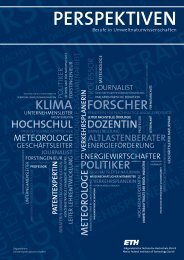
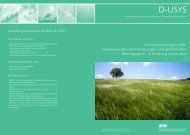
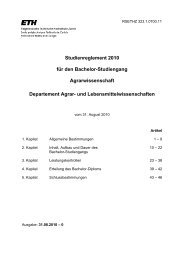

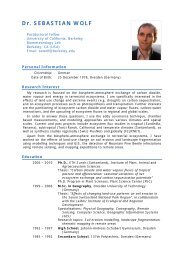
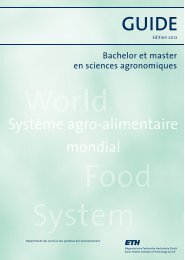
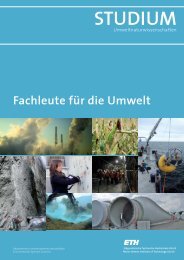
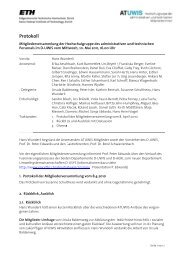
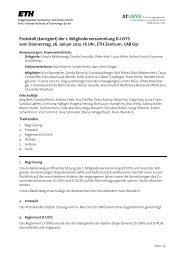

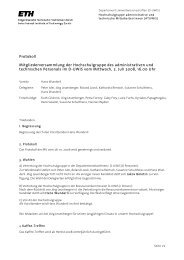
![Wegleitung [PDF] - ETH - ETH Zürich](https://img.yumpu.com/32408940/1/184x260/wegleitung-pdf-eth-eth-za-1-4-rich.jpg?quality=85)
